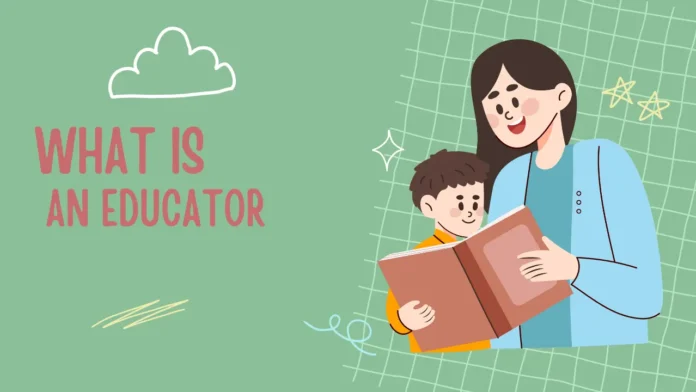In education, educators have a crucial role. They shape students’ minds and help them grow intellectually and personally. But what exactly is an educator? This guide explores the multifaceted role of educators in modern learning. We’ll cover their responsibilities, challenges, and essential skills.
Defining the Role of an Educator:
An educator is someone who shares knowledge, skills, and values with students in various settings like schools, colleges, or informal places. Their main goal is to promote learning, critical thinking, and a passion for knowledge in students.
The Key Responsibilities of an Educator:
Planning Engaging Lessons:
Educators design and plan exciting lessons to meet the diverse needs of their students. They use innovative teaching methods to make learning enjoyable and effective.
Creating a Positive Learning Environment:
Skilled educators understand the importance of a positive and inclusive learning environment. They create a safe space where students feel comfortable expressing their thoughts, fostering mutual respect and cooperation.
Delivering Instruction Effectively:
Educators must communicate complex concepts clearly, adapting their teaching style to accommodate different learning styles.
Assessing Student Progress:
Regular assessment is essential. Educators evaluate students’ understanding, identify areas of improvement, and provide constructive feedback.
Providing Guidance and Support:
Educators act as mentors, providing academic and personal guidance to help students navigate their paths.
Emphasizing Lifelong Learning:
Instilling a passion for lifelong learning is crucial. Educators inspire students to explore new subjects and pursue knowledge beyond the classroom.
The Challenges Faced by Educators:
Being an educator comes with challenges. Effective educators acknowledge and address these challenges for professional growth and effectiveness.
Classroom Management:
Maintaining discipline can be a significant challenge. Effective classroom management strategies ensure a conducive learning environment.
Catering to Diverse Learning Needs:
Each student is unique, and educators must cater to diverse learning needs and abilities.
Balancing Workload and Personal Life:
Educators face a demanding workload, including lesson planning and grading. Balancing this with personal life can be challenging.
Keeping Abreast of Educational Advancements:
Educators must stay updated with the latest teaching methodologies and technological advancements.
Dealing with Student Challenges:
Educators may encounter students facing various challenges, such as learning disabilities or behavioral issues. Sensitivity and empathy are essential.
Essential Skills for Educators:
Communication Skills:
Clear and effective communication is crucial for successful teaching.
Patience and Empathy:
Patience and empathy help educators connect with their students on a deeper level.
Adaptability:
Adapting to different learning styles is essential for accommodating the diversity of students.
Technological Proficiency:
Using technology effectively enhances the learning experience.
Continuous Learning:
professional development is vital for educators to remain effective.
Conclusion:
Educators are not just dispensers of knowledge; they are mentors and guides. They shape minds and hearts, leaving an indelible impact on society. Embracing challenges and responsibilities, educators inspire and transform lives.
FAQs:
What qualifications are required to become an educator?
Educational requirements vary, but a bachelor’s degree in education or a specific subject is essential, along with appropriate teaching certifications.
Can educators specialize in specific subjects?
Yes, educators can specialize in specific subjects, developing expertise in a particular area.
What teaching methods do educators employ for online learning?
Educators use video lectures, quizzes, virtual simulations, and collaborative online platforms for online teaching.
How can educators cater to students with learning disabilities?
Differentiated instruction, additional support, and assistive technologies help educators support students with learning disabilities.
How do educators foster creativity in the classroom?
Encouraging open-ended discussions, project-based learning, and artistic expression fosters creativity.
How do educators address behavioral issues in the classroom?
Positive reinforcement, behavior management plans, and open communication help address behavioral issues.
How do educators stay motivated in challenging times?
Educators stay motivated by focusing on the positive impact they have on students’ lives and seeking support from colleagues. Continuous professional development is also essential.


